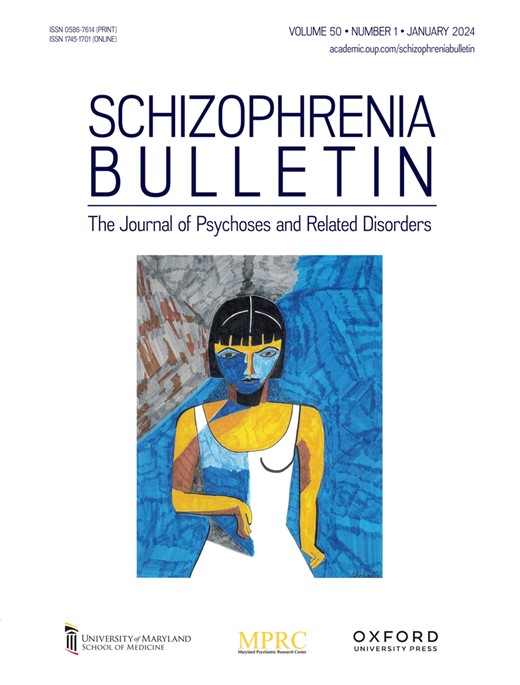针对精神分裂症患者的用户自导和人工支持数字健康干预措施的功效:系统回顾与元分析
IF 5.3
1区 医学
Q1 PSYCHIATRY
引用次数: 0
摘要
背景 数字健康干预(DHIs)可以低成本、可扩展地改善成人精神分裂症患者的护理质量。鉴于使用这些工具的研究数量正在快速增长,本综述旨在评估针对精神分裂症患者的数字健康干预措施随机对照试验(RCT)的有效性和可行性,重点关注人工支持。设计 2024 年 1 月,对 PubMed、Embase、PsycINFO、CINAHL、Web of Science 和 Cochrane 数据库进行了系统检索,以确定相关的 RCT。随机效应荟萃分析用于评估对精神病症状、认知和其他健康相关结果的影响。结果 共纳入 26 项 RCT(n = 2481 名参与者)。合并招募率和保留率分别为 57.4% 和 87.6%。在所有研究结果中,包括精神病症状、抑郁、生活质量、整体和社会认知、整体和社会功能以及服药依从性,DHIs 均未显示出具有统计学意义的效应大小。三分之一(34.6%)的 DHI 是通过共同设计开发的,而大多数(70%)的 DHI 是针对用户的个性化干预,69.2% 的 DHI 被认为存在高偏倚风险。在社会认知和生活质量方面,有人类支持的 DHIs 更受青睐。结论 对精神分裂症患者来说,精神健康倡议是可行的,而且可能有助于改善健康状况,尤其是在包含人工支持的情况下。需要进行更多高质量的研究,以考察在 DHIs 中人力支持的益处。未来的研究应考察在真实世界的临床环境中持续坚持治疗的可行性以及数字化干预措施的益处,可能的话,将人机互动与人工智能相结合。本文章由计算机程序翻译,如有差异,请以英文原文为准。
Efficacy of User Self-Led and Human-Supported Digital Health Interventions for People With Schizophrenia: A Systematic Review and Meta-Analysis
Background Digital health interventions (DHIs) may enable low cost, scalable improvements in the quality of care for adults with schizophrenia. Given the fast-growing number of studies using these tools, this review aimed to assess the efficacy and feasibility of randomized controlled trials (RCTs) of DHIs among people with schizophrenia, focusing on human support. Design A systematic search of PubMed, Embase, PsycINFO, CINAHL, Web of Science, and Cochrane databases was conducted in January 2024 to identify relevant RCTs. Random effects meta-analyses were undertaken to evaluate the effects on psychosis symptoms, cognition, and other health-related outcomes. Results Twenty-six RCTs (n = 2481 participants) were included. Pooled recruitment and retention rates were 57.4% and 87.6%, respectively. DHIs showed no statistically significant effect sizes across all examined outcomes, including psychosis symptoms, depression, quality of life, global and social cognition, global and social functioning, and medication adherence. A third (34.6%) of DHIs were developed using co-design while the majority (70%) personalized the intervention to its users and 69.2% were deemed to be at high risk of bias. There were trends toward effects in favor of DHIs with human support for social cognition and quality of life. Conclusions DHIs are feasible for people with schizophrenia and potentially useful for improving health outcomes, particularly when including human support. More high-quality studies are required to examine the benefits of human support within DHIs. Future research should examine the feasibility of sustained adherence and benefits from digital interventions, possibly incorporating human interaction complemented with artificial intelligence, in real-world clinical settings.
求助全文
通过发布文献求助,成功后即可免费获取论文全文。
去求助
来源期刊

Schizophrenia Bulletin
医学-精神病学
CiteScore
11.40
自引率
6.10%
发文量
163
审稿时长
4-8 weeks
期刊介绍:
Schizophrenia Bulletin seeks to review recent developments and empirically based hypotheses regarding the etiology and treatment of schizophrenia. We view the field as broad and deep, and will publish new knowledge ranging from the molecular basis to social and cultural factors. We will give new emphasis to translational reports which simultaneously highlight basic neurobiological mechanisms and clinical manifestations. Some of the Bulletin content is invited as special features or manuscripts organized as a theme by special guest editors. Most pages of the Bulletin are devoted to unsolicited manuscripts of high quality that report original data or where we can provide a special venue for a major study or workshop report. Supplement issues are sometimes provided for manuscripts reporting from a recent conference.
 求助内容:
求助内容: 应助结果提醒方式:
应助结果提醒方式:


